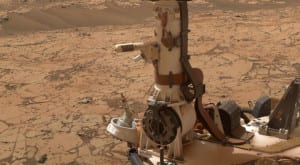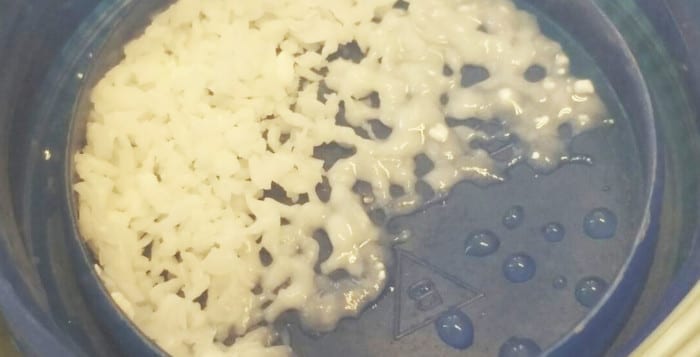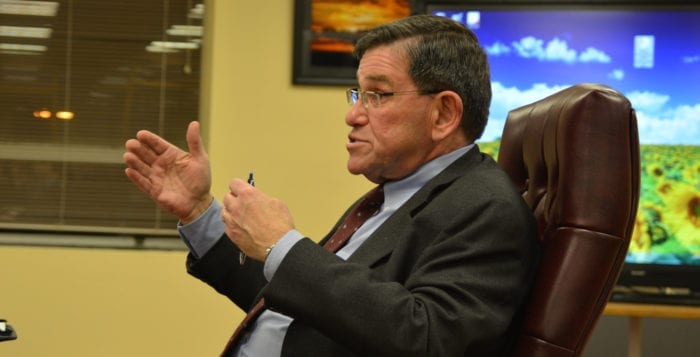By Daniel Dunaief
It’s not exactly an oasis filled with unexplored life in the middle of a barren dessert. Rather, it is likely a small amount of liquid water that forms during the night and evaporates during the day. What makes this water so remarkable and enticing, however, is that, while it’s in our solar system, it is far, far away: about 225 million miles.
The rover Curiosity, which landed on Mars in the summer of 2012 after a 253-day journey from Earth, has gathered weather data from the Gale Crater on the Red Planet for the last year. That data has suggested the likely presence of liquid water.
“The cool part of this is the present-day nature of it,” said Tim Glotch, an associate professor at the Department of Geosciences at Stony Brook University, who studies the role of water in shaping the surface of Mars. “It’s there right now.”

The liquid water is in the form of brine, which is a mix of water and salts. The perchlorate salts on or near the surface of Mars melt the ice that forms during the cold parts of the Martian night. It’s similar, Glotch said, to the way salts melt black ice during a frigid Long Island evening.
Curiosity, which is about the size of a small car, can’t detect this liquid water because its electronics don’t operate during temperatures that plunge at night to around 100 degrees below zero Fahrenheit.
The findings, which were reported last week in the journal Nature Geosciences, have competing implications. For starters, said lead author Javier Martin-Torres, who works at Lulea University of Technology in Sweden and is a part of the Spanish Research Council in Spain and a member of Curiosity’s science team, the water is in one of the least likely places on Mars.
“We see evidence of conditions for brine in the worst-case scenario on Mars,” Martin-Torres said in a Skype interview last week from Sweden. “We are in the hottest and driest place on the planet. Because we know that perchlorates are all over the planet — which we have seen from satellite images — we think there must be brine everywhere.”
Given the radiation, temperature fluctuations and other atmospheric challenges, however, the conditions for life, even microorganisms, to survive in these small droplets of water are “terrible,” Martin-Torres said.
Still, the fact that “we see a water cycle, in the present atmosphere, is very exciting,” Martin-Torres said. “This has implications in meteorology.”
Deanne Rogers, an assistant professor in the Department of Geosciences at Stony Brook, said the likelihood of water bound to perchlorate salts directly affects her own research.
“Something I work on is sulfate minerals on Mars,” she said. “They can take on water and get rid of them easily by exchanging water vapor with the atmosphere.” She may incorporate perchlorates into future grant proposals.
Briny water, Rogers said, may also explain the dark streaks that appear on Mars at mid and low latitudes. These streaks look like running water going down a slope.
“People try to explain what these are,” she said. “It can’t be pure liquid water. It might be perchlorates taking on water vapor and producing dark streaks.”
By landing on the planet and sending readings back to researchers, Curiosity and other land-based vehicles can offer firsthand evidence of environmental conditions.
“Direct measurements are way more precise than what we can do from orbit,” Rogers said.
In the first week after the paper came out, Martin-Torres said he spent about 85 percent of his work time talking to the media, scientists or people asking questions about his studies. He has also received more than 10 times the typical number of requests from prospective Ph.D. students who would like to work in his lab while scientists from around the world have reached out to form collaborations.
Rogers explained that students might react to this kind of discovery the same way she did to other data and images from Mars in the early stages of her career.
“When Pathfinder landed in 1997, I saw the beautiful, colorful panoramas in the newspaper,” she said. “That’s when I knew what I was going to do. I hope that kids feel the same way.”
Martin-Torres, who said he has already submitted additional research proposals based on this discovery, described the current era of Mars research as the “golden age of Mars exploration.”






